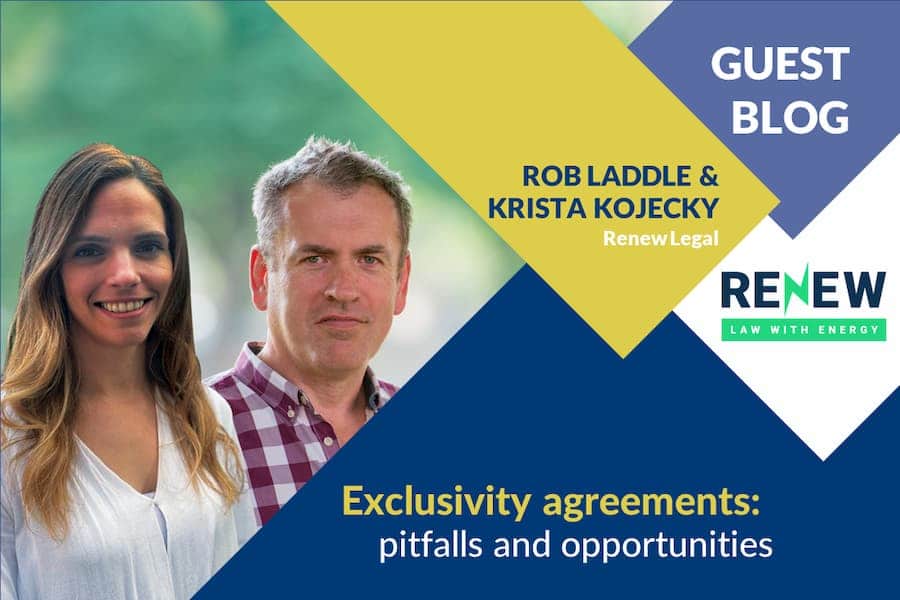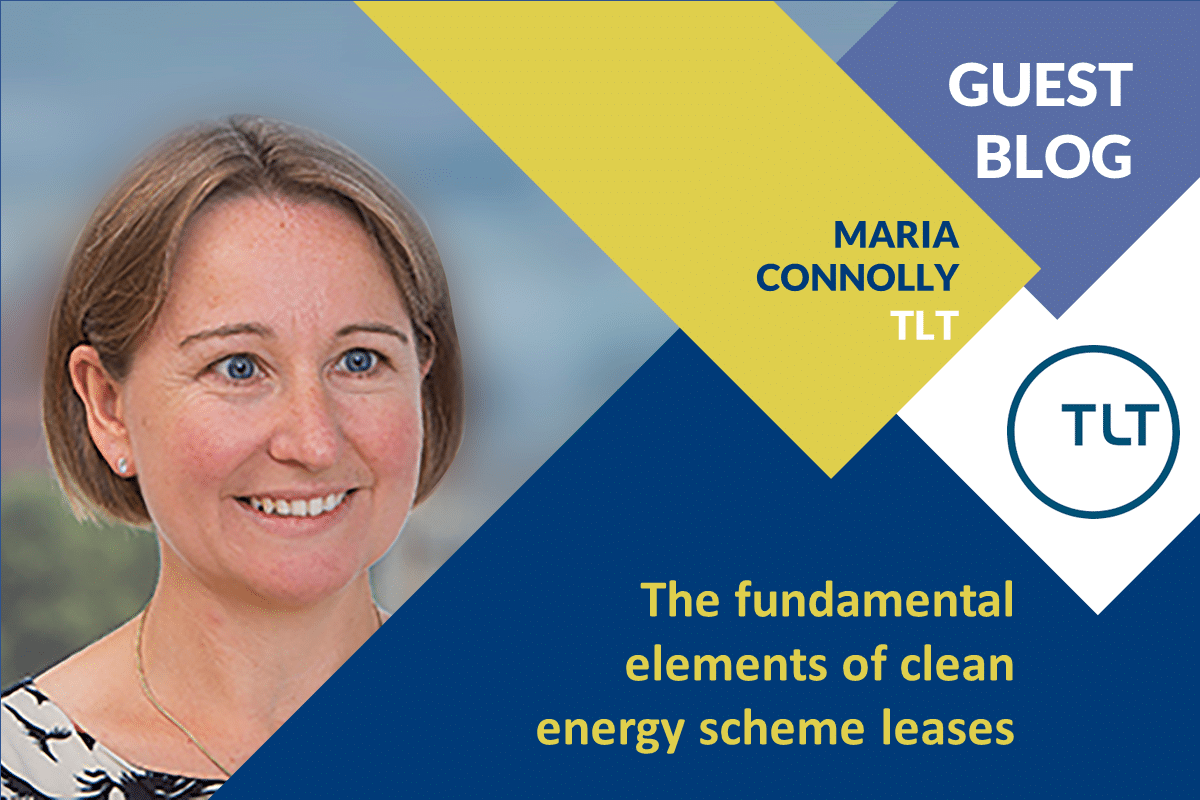Exclusivity agreements for energy schemes:
pitfalls and opportunities
As solar, wind and battery technologies mature, and demand for clean power increases, demand for viable renewables and energy storage sites is growing fast. In seeking to achieve a scheme, one of the first steps a developer will take is to secure an exclusivity agreement with the landowner. Exclusivity agreements lock-up land for a set period of time while the developer undertakes a number of initial tasks – but these undertakings might be entered into without negotiation of terms or due consideration of the impacts they may have.
In this latest instalment of our guest blogs, we take a closer look at exclusivity agreements, speaking to Rob Laddle and Krista Kojecky from the expert team at Renew Legal, to understand what they are, the issues that can arise from them and if there are alternative approaches.
Hugh: What is an exclusivity agreement?
Krista: Exclusivity agreements are entered into at the start of a transaction, creating a framework and timeframe for the parties to jointly work within. The primary intention is to bind the parties to deal exclusively with one another, preventing the landowner from negotiating with other developers and essentially ringfencing the land or property for use by the developer until the next stage of negotiations is undertaken or the exclusivity period ends.
It will typically be put into place before any due diligence is undertaken and gives a time cap for the developer to enter into an option to lease or a contract to buy.
As exclusivity agreements are bespoke, it is important for both sides to agree the terms unequivocally, keeping in mind the balance of power. Terms should be set out clearly with any risks mitigated or practical resolutions agreed. For example, occasionally the parties may agree on a minor deposit as a safeguard, however, it should be borne in mind that either party could walk away at any time.
Ultimately, the aim of an exclusivity agreement is to reduce risk, wasted costs, and time.
Hugh: When are they normally entered in to?
Krista: They’re entered into when a developer either wishes to buy or rent land, or is interested in investigating the potential of doing so. They are also entered into if a developer wants to lay claim to a potential purchase, prevent other developers from securing the site, having access to it or the use of the site’s facilities.
Whether or not an Exclusivity Agreement is used at the start of a transaction will depend on the parties’ appetite for risk – by no means are they agreed on every deal.
Rob: Exclusivity is the first step in increasing the security for both sides. Developers don’t want to spend money on surveys or planning work unless they have the site in hand – it’s a lot to do with risk mitigation to development expenditure.
Krista: However, developers do then tend to start their legal due diligence, as exclusivity gives them a safe space to start looking into the site without the risk of losing out to another developer.
Hugh: Are there any issues with this status quo?
Rob: One concern from a landowner perspective is that developers can use exclusivity agreements to create a landbank by signing up a number of landowners in an area for an extended amount of time. If care isn’t taken with the exclusivity arrangements a developer could potentially secure exclusive rights to deal with land and then move on to other areas in which they are working to a tighter and more pressing timetable.
This can leave landowners stuck with no right to speak to other developers and tied into a commercial deal that may have been made without a full understanding of the true value of the land.
Krista: Being tied into an exclusivity period could work against either party. The landowner is tied up in an agreement that may not bear fruit, and the developer may have spent money on resources before finding something undesirable that means the site loses potential for them.
People often enter into exclusivity agreements fast as they want to get moving but may overlook the restrictions they impose, or not consider the implications beyond the potential profit, without stipulating safeguards.
Hugh: Is there an alternative approach to exclusivity that mitigates these issues?
Rob: Both parties need to consider what they need to achieve by entering into a legally binding agreement. Are they happy to tie up their land/resources for a prolonged period of time?
Landowners need to consider whether they will want to do anything with their land in the proposed time period and if an agreement is likely to halt any development potential by locking it up.
Setting milestones and associated activities within set timeframes for completion is a sensible idea. If an activity hasn’t been met by a certain date, there should be an option to end the agreement. This way the landowner will understand the key principles and what should happen and when – and they can then get the appropriate support from an energy expert or land agent to guide them.
There is nothing wrong with exclusivity agreements, but they should be far more sculpted to tailor to the aims of what both parties want to achieve in set blocks of time.
Hugh: Exclusivity agreements often form part of a wider heads of terms document for an option and lease. Do these need to be together?
Krista: This can often put the landowner in a difficult position, as the more detailed and far reaching the exclusivity agreement, the more important it is that the landowner seeks advice before signing. If an exclusivity agreement includes detailed terms for an option and lease, this carries with it a risk that the parties are bound by commercial terms, which could well have hidden legal ramifications. Unless the concerned party is willing to pay the upfront cost of having such a dual purpose document reviewed by agents and lawyer, I would recommend keeping the two separate.
Hugh: If there is one piece of advice you could give to landowners what would it be?
Rob: Landowners should ask what the exclusivity agreement is for. Set out the period of time and what tasks the developers should do within it. Sometimes it might just be that they want permission to conduct the initial investigations to a site, so it could be exclusively for access. But don’t just sign up for a long time. If the work can be done in one month, don’t sign up for six months – keep it precise and relevant, taking into account what needs to be done.
Look at the end goal and work backwards. Know what date planning wants to be in place by. From this it can be determined what date an option on the heads of terms needs to be in place.
The danger for the landowner is how tempting the offer looks on day one, but when they come to understand the implications and dynamics, they could have given too much away.
Krista: Think before you sign and take advice from a trusted agent or solicitor who knows the market and the individual circumstances to inform on whether it’s worthwhile entering into or not. Anyone who has an exclusivity agreement put in front of them should think very carefully about the implications – but also weigh these up against the upsides.
There is often a trade-off between incurring costs prior to signing up to an exclusivity agreement and getting the right amount of advice to understand if it will work for you. Ultimately, it is down to the individual and their appetite for risk but I would always recommend, at the very least, talking it through with a trusted advisor before putting pen to paper – or these days – hitting control V.
Hugh: Thank you. Can you tell us more about Renew Legal?
Rob: Christie Skudder and I set up Renew Legal seven and a half years ago in response to what we considered an opportunity to provide focused, sector-specific support to the energy sector. In my time working as an in-house lawyer and working in renewables in particular I realised that there was room for a niche practice that married the approaches inherent in working within a business with the benefits of a single-market sector-focus. In 2013 we look the leap and haven’t looked back. We are now a multi-national practice authorised to operate in England, Wales and Scotland with 8 solicitors providing legal support across the standard project lifecycle – covering property, construction, commercial, corporate and disputes.
In addition to the type of services that would be expected from a standard law firm, we also provide what we call virtual in-house support. Utilising the in-house experience of a number of our team, we can provide lawyers to clients that do not wish to add to their headcount, or just wish to supplement their legal team during periods of high demand. A key driver of our business is to keep our overheads low and working practices flexible so we are able to offer highly experienced “partner level” lawyers to our clients at rates that other more traditional firms cannot match.
 Rob Laddle, Renew Legal Director: Named by the Legal 500 as one of a small number of Leading Individuals in Energy in the South West, Rob has over 20 years’ experience in the energy industry. Prior to co-founding Renew Legal in 2013 he held senior legal and commercial management roles within RWE, providing general commercial and project support to the retail, generation, trading, energy service and renewables divisions. Working closely with clients, he has extensive experience of energy storage, solar, biomass, CHP, anaerobic digestion and both onshore and offshore wind from a renewables perspective, and thermal generation from small scale peaking plant to CCGTs.
Rob Laddle, Renew Legal Director: Named by the Legal 500 as one of a small number of Leading Individuals in Energy in the South West, Rob has over 20 years’ experience in the energy industry. Prior to co-founding Renew Legal in 2013 he held senior legal and commercial management roles within RWE, providing general commercial and project support to the retail, generation, trading, energy service and renewables divisions. Working closely with clients, he has extensive experience of energy storage, solar, biomass, CHP, anaerobic digestion and both onshore and offshore wind from a renewables perspective, and thermal generation from small scale peaking plant to CCGTs.
Tel: 07795 418602
email: laddle@renewlegal.com
LinkedIn
 Krista Kojecky, senior associate, Renew Legal: Krista joined the Renew Legal team in September 2020, after spending five years as an associate at Farrer and Co – working predominantly on commercial property for funders, developers and investors – and five years at Dentons where she trained and specialised in real estate, energy and renewables. She focuses on property law and has extensive specialist experience in renewable energy projects
Krista Kojecky, senior associate, Renew Legal: Krista joined the Renew Legal team in September 2020, after spending five years as an associate at Farrer and Co – working predominantly on commercial property for funders, developers and investors – and five years at Dentons where she trained and specialised in real estate, energy and renewables. She focuses on property law and has extensive specialist experience in renewable energy projects
Tel: 07340 991455
email: kojecky@renewlegal.com
LinkedIn
Contact us
If you want to find out more how Renew Legal can help you, please contact Rob or Krista using their details above.





